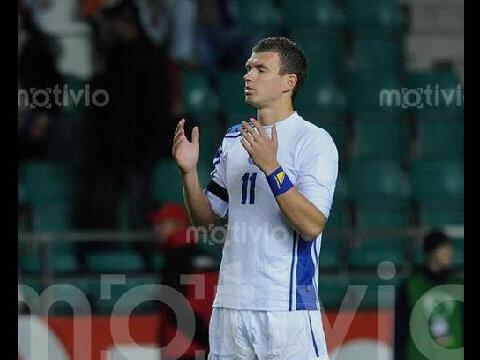Dzeko and his large family continued life in the one bedroom flat of his grandmothers house which could barely afford 3 meals a day. A situation similar to thousands upon thousands of Bosniaks and Croats during the conflict which later became a genocide or ''ethnic cleansing''.
 | ||
| Bosniaks arguably suffered the most |
Rather than dwelling on the conflict torn past of his country which as left visible scars on todays Bosnian society Dzeko now preaches unity and tolerance among the youngsters of Bosnia now that the war is over in order to bring peace amongst the Serbian, Bosnian and Croat communities and build the bridges that were never there when he was a child. In a country where some schools are still seperated due to fear of tension between ethnic groups Edin (a unicef ambassador) aims to heal the wounds left by the war.
''I try to do something to make change’ Dzeko told Sportsmail. ‘I tend to go into schools in Bosnia, where there is still much to do'
‘Many of the schools are divided. It’s like two schools in one, with the Bosnian on one side and the Croats on the other.
‘I go there to try to persuade them to come together and mix, because the war led to mistrust and hate, so things are difficult.
‘I try to show the children that it’s not important what their name is or my name is or whether we are Muslim, Christian or Catholic.
‘I want to show them that the most important thing is that you’re a good man or a good woman.
‘Look at Aleksandar. What is important to me is that somebody is a good man, and he is a good man.
 |
| Edin and Aleksander show that old tensions don't have to remain |
Nowadays known as the 'diamant' in Bosnia it was not always easy to learn the traits of his talent as a youngster. Between dodging bombs Edin would get his fair share of a kickabout with his mates. However one day this all came to an abrupt end when he was playing in a field and his mother instinctively called him in. Just seconds after he had cried and put up an argument with his mother…a bomb exploded on the exact place he was playing. Many of his friends in that incident were not so lucky. His mother Belma’s decision to force her son indoors saved his life literally.
‘With children it’s always easy,’ Edin said. ‘They are very important and we have to show them that. If somebody wants to take my photo or have an autograph then I will always try to do it.’
Speaking about their personal experience in the 2nd biggest atrocity in Europe since the Holocaust, Dzeko and his mother have gone on to say:
‘My gut feeling saved my son’s life,’ Belma said. Nowadays Edin rarely speaks about the conflict, it seems as though he has cut himself of from all memories. And who would blame him. During an interview he said:
‘My childhood is in the past now, It was hard but I was not the only one to go through it.
‘In Bosnia it was war between the ages of 6 and 10 for me, so it was hard to go out and do anything or live a normal life.
‘But I was young, it’s over now and I don’t want to speak too much about it.
‘After war was finished I was able to play football again.
‘My father Midhat took me to the club [Zeljeznicar] every day for weeks as we didn’t have enough money for constant taxis.
‘I am close to my parents, of course, as everything I have done is because of them. They went through a lot for me and they are most important for me.
‘They were here last week and came to the Notts County game, so they saw me score and that made me happy.
As he is keen to mention in this interview conducted by sportsmail (google source), Edin's story is not unique. It is hard to find a family in Bosnia or through the Bosnian diaspora who do not have a horrible recount of some related tragedy through the war. Men and young boys were lined up by the nationalist Serbian 'forces' and shot dead, some families lost all their male members. The ethnic cleansing claimed the life of thousands of Muslim boys and girls and men and women who were too systematically raped in camps eerily similar to those used during the Nazi atrocities in the holocaust. The only difference is, all this occurred in the 90s not the 40s. Families were torn apart. In many instances UN safe camps were set up for Bosniaks to go and stay and they were promised that they would be kept safe from Serb soldiers. The most famous of this case being srebrenica disaster. Just this July was the anniversary of the war and Srebrenica disaster. This year alone many bodies were uncovered and the remains were finally put to rest peacefully by the families of the people. Bosnia still lives today with the scars of this disaster.
2014 update: Since I originally wrote this post in 2010, some more mass graves have been uncovered in various parts of Bosnia, in some cases holding up to 100s of corpses.